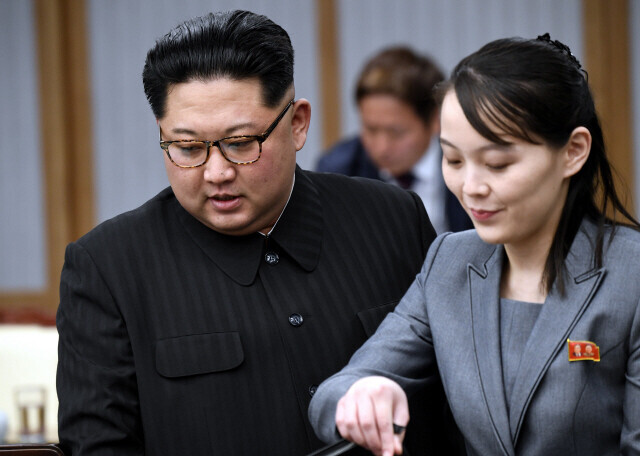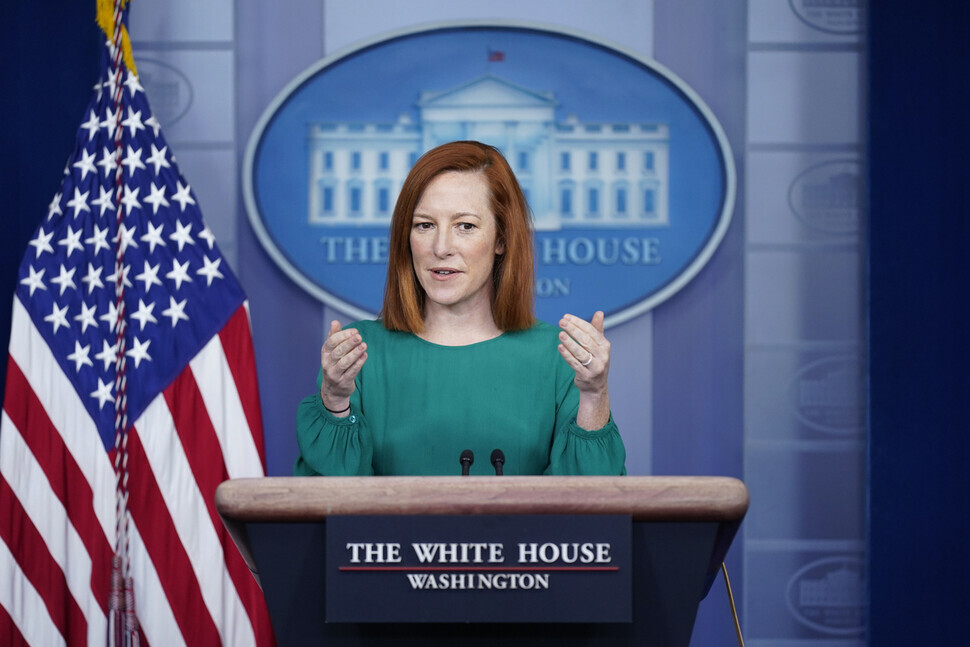hankyoreh
Links to other country sites 다른 나라 사이트 링크
[News analysis] N. Korea slams S. Korea day before US Secretary of State’s visit

Kim Yo-jong, sister of North Korean leader Kim Jong-un, publicly criticized the South Korea-US military exercises Tuesday that began on March 8. She described the exercises as “a war game against our Republic,” referring to North Korea, and “a wrong deed” that crossed a “red line.”
The personal statement by Kim, whose official position is first deputy director of the Central Committee of the Workers’ Party of Korea (WPK), was titled “It will be hard to see again spring days three years ago.” The title refers to the thaw in inter-Korean relations that followed the PyeongChang Winter Olympics in 2018.
“War drill and hostility can never go with dialogue and cooperation,” Kim said, adding that “We [will] also examine the issue of dissolving the Kumgangsan International Tourism Bureau and other organizations concerned [with] any cooperation and exchange with the [South] Korean authorities,” including the “Committee for the Peaceful Reunification of the Fatherland, an organization for dialogue with the [South].”
“And if [the South Korean authorities] dare resort to more provocative acts, we may take a special measure of resolutely abrogating even the [North-South] military agreement,” Kim also said, referring to the Comprehensive Military Agreement (CMA), concluded on Sept. 19, 2018.
Kim threatened to return inter-Korean relations to the period of confrontation, when there was no dialogue, exchange, or cooperation or even to the period of military conflict and clashes, depending on how things develop.
Kim’s statement was released the very morning that US Secretary of State Antony Blinken and Defense Secretary Lloyd Austin were visiting Japan, and one day before their visit to South Korea.
That timing shows that Kim’s statement, though mainly criticizing the South Korean authorities, is also intended to send a message to the US administration, under President Joe Biden, which is reviewing its North Korea policy.
“We take this opportunity to warn the new US administration,” Kim said in the statement. “If it wants to sleep in peace for [the] coming four years, it had better refrain from causing a stink at its first step.”
That harkens back to the US policy approach that Kim Jong-un expressed in his speech at the 8th WPK Congress on Jan. 5-7, when he said that the North would “approach the US on the principle of power for power and goodwill for goodwill.” It represents Pyongyang’s first public remarks specifically addressed to the new US administration.
Kim Yo-jong’s statement is also consistent with her elder brother’s policy toward South Korea and the US. Following the failure of North Korea and the US’s second summit in Hanoi, in February 2019, Kim Jong-un decided to shake up inter-Korean relations in an attempt to make the US budge.
But considering that the Biden administration has openly placed a priority on alliances and pledged to strengthen trilateral cooperation with South Korea and Japan, there’s very little chance that it will aggressively pursue negotiations with the North.
So whatever Kim Jong-un’s intentions may be, any attempt to get the attention of the US by sacrificing inter-Korean relations would probably worsen North Korea-US relations and further darken the situation on the Korean Peninsula.

In addition to appearing in the Korean Central News Agency (KCNA), which is published for a foreign audience, the statement was also given unusually wide coverage inside North Korea, including on Korean Central Television and in the Rodong Sinmun, the organ of the WPK Central Committee.
That suggests the message was also designed to satisfy internal political needs, in addition to sending a warning to South Korea and the US. Since the message was officially promulgated to the North Korean public, Kim Yo-jong’s words will likely lead to action down the road.
That’s reminiscent of North Korea’s behavior during the controversy over propaganda balloons that were being sent into the North in June 2020. Pyongyang rattled inter-Korean relations with the following sequence of events: Kim Yo-jong issued a statement taking issue with the balloon launches by certain defector groups in South Korea on June 4; North Korea blew up the Inter-Korean Liaison Office in Kaesong on June 12; a spokesperson for the General Staff Department of the Korean People’s Army (KPA) announced four military measures on June 17; and then Kim Jong-un ordered the deferral of plans for military action against the South on June 24.
North Korea could move to effectively scuttle the CMAFeelings of hostility toward South Korea were also incited by a series of columns in the Rodong Sinmun by a range of figures, including the chair of the WPK’s committee in Pyongyang, and by demonstrations organized by groups such as the Socialist Women’s Union of Korea. Kim Yo-jong’s statement could once again lead to demonstrations and columns in the Rodong Sinmun.
North Korea’s move seems aimed at stirring up hostility toward the South with the hope of dispelling discontent in the populace over the deteriorating situation abroad; worsening economic conditions brought on by the triple whammy of sanctions, COVID-19, and natural disasters; and the ongoing campaign to achieve a “frontal breakthrough” through “self-sufficiency.” That represents the “political internalization of South Korea policy,” which could inflict damage on inter-Korean relations that wouldn’t be easy to repair.
Among the various measures that Kim Yo-jong said the North might take against South Korea in her statement, the warning about scrapping the inter-Korean military agreement, known as the CMA, has greater strategic implications for the Korean Peninsula than the threat to dissolve government agencies responsible for dialogue, exchange, and cooperation with the South. Actually scrapping the CMA, which has served as a safety valve for peace on the peninsula, would upend the geography of inter-Korean relations under Kim Jong-un and South Korean President Moon Jae-in, potentially subjecting the Korean Peninsula to one shock after another.
During the propaganda balloon crisis in June 2020, Kim Yo-jong mentioned, “the scrapping of the [North-South] agreement in [the] military field which is hardly of any value” in a statement on June 4, and the KPA General Staff Department mentioned the same idea in a subsequent statement that also threatened to resume military exercises on the border and to rebuild guard posts in the demilitarized zone (DMZ). But those movements were halted when Kim Jong-un ordered their deferral.
In her latest statement, Kim Yo-jong said that the proposed dissolution of the Committee for the Peaceful Reunification of the Country and the Kumgangsan International Tourism Bureau had “already been reported to our supreme leadership,” suggesting that their dissolution is imminent. But by predicating the abrogation of the CMA on South Korea taking “more provocative acts,” Kim hinted that that idea had been shelved for now.
But some observers think that North Korea could move to effectively scuttle the CMA by taking activities banned under the agreement, such as resuming gunnery practice by coastal batteries in the vicinity of the Northern Limit Line (NLL) in the Yellow Sea.
“American sanctions make it difficult for Kim Jong-un to opt for strategic military actions such as nuclear tests or ICBM test launches. Kim might take steps to scrap the CMA so as to get through to the US,” said a former high-ranking official in the South Korean military.
“North Korea needs to remember that badgering South Korea is bound to also worsen its relations with the US. The South Korean and US governments need to quickly devise a comprehensive approach to talks with North Korea so that we can restart the Korean Peninsula peace process,” another high-ranking official said.
By Lee Je-hun, senior staff writer
Please direct comments or questions to [english@hani.co.kr]

Editorial・opinion
![[Column] Season 2 of special prosecutor probe may be coming to Korea soon [Column] Season 2 of special prosecutor probe may be coming to Korea soon](https://flexible.img.hani.co.kr/flexible/normal/500/300/imgdb/original/2024/0426/3317141030699447.jpg) [Column] Season 2 of special prosecutor probe may be coming to Korea soon
[Column] Season 2 of special prosecutor probe may be coming to Korea soon![[Column] Park Geun-hye déjà vu in Yoon Suk-yeol [Column] Park Geun-hye déjà vu in Yoon Suk-yeol](https://flexible.img.hani.co.kr/flexible/normal/500/300/imgdb/original/2024/0424/651713945113788.jpg) [Column] Park Geun-hye déjà vu in Yoon Suk-yeol
[Column] Park Geun-hye déjà vu in Yoon Suk-yeol- [Editorial] New weight of N. Korea’s nuclear threats makes dialogue all the more urgent
- [Guest essay] The real reason Korea’s new right wants to dub Rhee a founding father
- [Column] ‘Choson’: Is it time we start referring to N. Korea in its own terms?
- [Editorial] Japan’s rewriting of history with Korea has gone too far
- [Column] The president’s questionable capacity for dialogue
- [Column] Are chaebol firms just pizza pies for families to divvy up as they please?
- [Column] Has Korea, too, crossed the Rubicon on China?
- [Correspondent’s column] In Japan’s alliance with US, echoes of its past alliances with UK
Most viewed articles
- 1Is Japan about to snatch control of Line messenger from Korea’s Naver?
- 2‘We must say no’: Seoul defense chief on Korean, USFK involvement in hypothetical Taiwan crisis
- 3S. Korea “monitoring developments” after report of secret Chinese police station in Seoul
- 4The dream K-drama boyfriend stealing hearts and screens in Japan
- 5Division commander ordered troops to enter raging flood waters before Marine died, survivor says
- 6[Editorial] New weight of N. Korea’s nuclear threats makes dialogue all the more urgent
- 7No good, very bad game for Korea puts it out of Olympics for first time since 1988
- 8[Column] ‘Choson’: Is it time we start referring to N. Korea in its own terms?
- 9‘Weddingflation’ breaks the bank for Korean couples-to-be
- 10[Column] Season 2 of special prosecutor probe may be coming to Korea soon